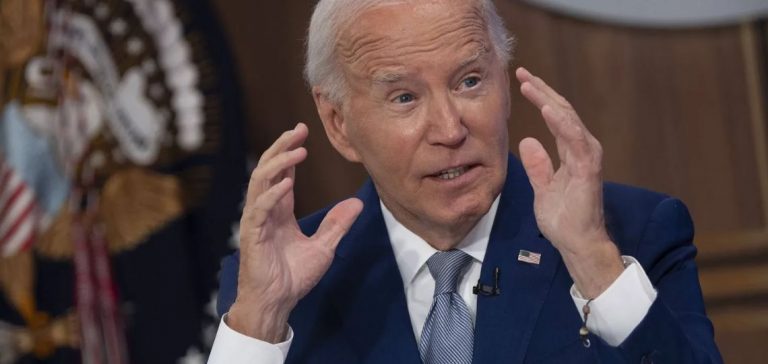The United States has announced new sanctions aimed at further weakening the Iranian economy by specifically targeting the country’s oil sector. These measures are part of a strategy to punish Iran for its ongoing support of organizations considered terrorist by the international community, as well as for the human rights violations perpetrated by the current regime.
The Iranian Ministry of Foreign Affairs responded by calling these sanctions “blatant violations of international law” and “malicious attempts at destabilization.” However, American authorities maintain that these sanctions are necessary to counter Iran’s harmful influence in the region and to compel the Iranian regime to respect the fundamental rights of its citizens.
The new sanctions imposed by the U.S. Department of the Treasury target not only Iranian companies in the oil sector but also around twenty ships and foreign companies accused of facilitating the transport of oil and petrochemical materials from Iran. This initiative aims to restrict Iran’s essential revenues, thereby limiting its capacity to financially support groups such as Hezbollah in Lebanon, the Houthis in Yemen, and Hamas in the Gaza Strip.
Iran’s Support for Terrorist Organizations
Iran is recognized for its financial and logistical support to several terrorist organizations active in the Middle East. Hezbollah, based in Lebanon, receives massive backing from Tehran, allowing it to strengthen its military and political presence in the region. Similarly, the Houthis in Yemen receive constant support, contributing to the prolongation of the conflict and instability in the Arabian Peninsula. Furthermore, Hamas, the Islamist group controlling the Gaza Strip, also receives financial and military support from Iran, thereby enhancing its operational capabilities against Israel.
The United States views these actions as a direct threat to regional and global security. By strengthening sanctions, Washington seeks to economically isolate Iran and reduce its ability to influence geopolitical dynamics in sensitive areas.
Human Rights Violations by the Iranian Regime
In addition to its support for terrorist organizations, the Iranian regime is regularly accused of human rights violations. International organizations such as Amnesty International and Human Rights Watch have documented cases of political repression, arbitrary detentions, restrictions on freedom of expression, and systemic discrimination against various minorities within the country.
These violations of fundamental rights contribute to the deterioration of the humanitarian situation in Iran and exacerbate internal tensions. The American sanctions also aim to pressure the Iranian regime to improve its respect for human rights and allow greater freedom for its citizens.
Missile Attacks by Iran
On October 1, 2024, Iran launched approximately 200 missiles at Israel in retaliation for the assassination of the Hamas Palestinian leader in Tehran, attributed to Israel, as well as leaders of Hezbollah in Lebanon and a general of the Islamic Revolutionary Guard Corps, the ideological branch of the Iranian army. These attacks caused significant damage and intensified the already high tensions between the two nations.
The Iranian assault is perceived by the United States and its allies as a military escalation aimed at further destabilizing the region and asserting Tehran’s military power. This offensive has also sparked international condemnations, reinforcing the argument in favor of economic sanctions as a means of diplomatic pressure.
Impact of Sanctions on the Iranian Oil Sector
The oil sector is the backbone of the Iranian economy. By targeting this sector, American sanctions aim to reduce the revenues generated from oil exports, thereby limiting the financial resources available for funding terrorist activities and perpetuating human rights violations. Additionally, asset freezes and the prohibition of transactions with Iranian companies reinforce Tehran’s economic isolation on the international stage.
These measures also impact Iran’s international commercial partners, forcing many companies to reassess their business relationships to avoid secondary sanctions. This economic pressure aims to compel Iran to modify its foreign and domestic policies.
International Reactions and Future Perspectives
The international community, particularly the United States’ allies, is closely observing the escalation of sanctions against Iran. Several European countries have expressed their support for the American measures while calling for a coordinated approach to maximize the impact of the sanctions.
However, some analysts caution against the potential humanitarian consequences of these sanctions, noting that the Iranian civilian population could also suffer. Nevertheless, the United States maintains that the priority is to target entities responsible for supporting terrorism and human rights violations, hoping thereby to reduce Iranian influence in regional conflicts and improve the human rights situation in Iran.
In the future, the persistence of sanctions could pave the way for new international negotiations aimed at finding diplomatic solutions to defuse tensions. However, as long as Iran continues to actively support terrorist organizations and violate the fundamental rights of its citizens, it is likely that sanctions will remain a key component of the American strategy to counter Tehran’s geopolitical ambitions.






















